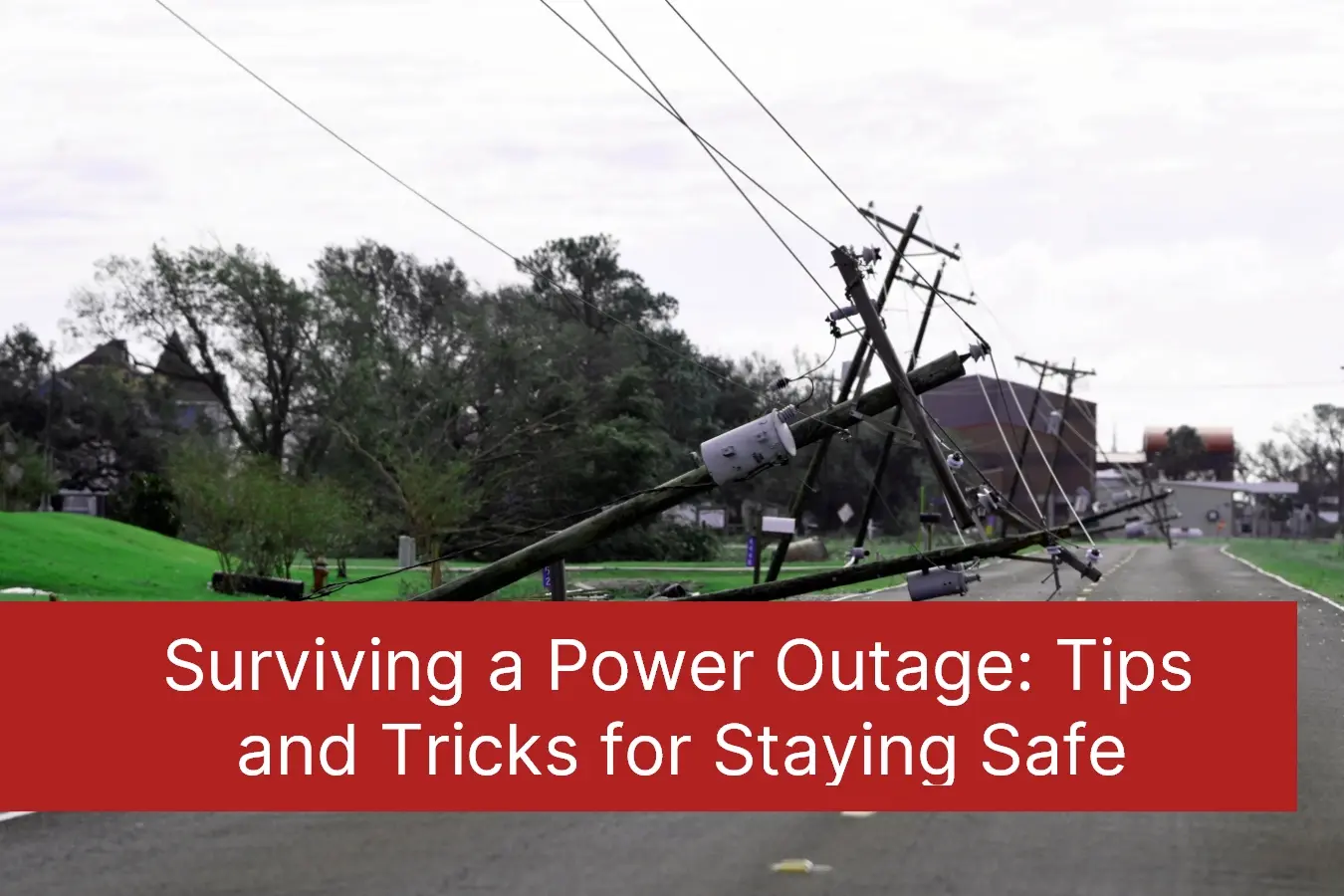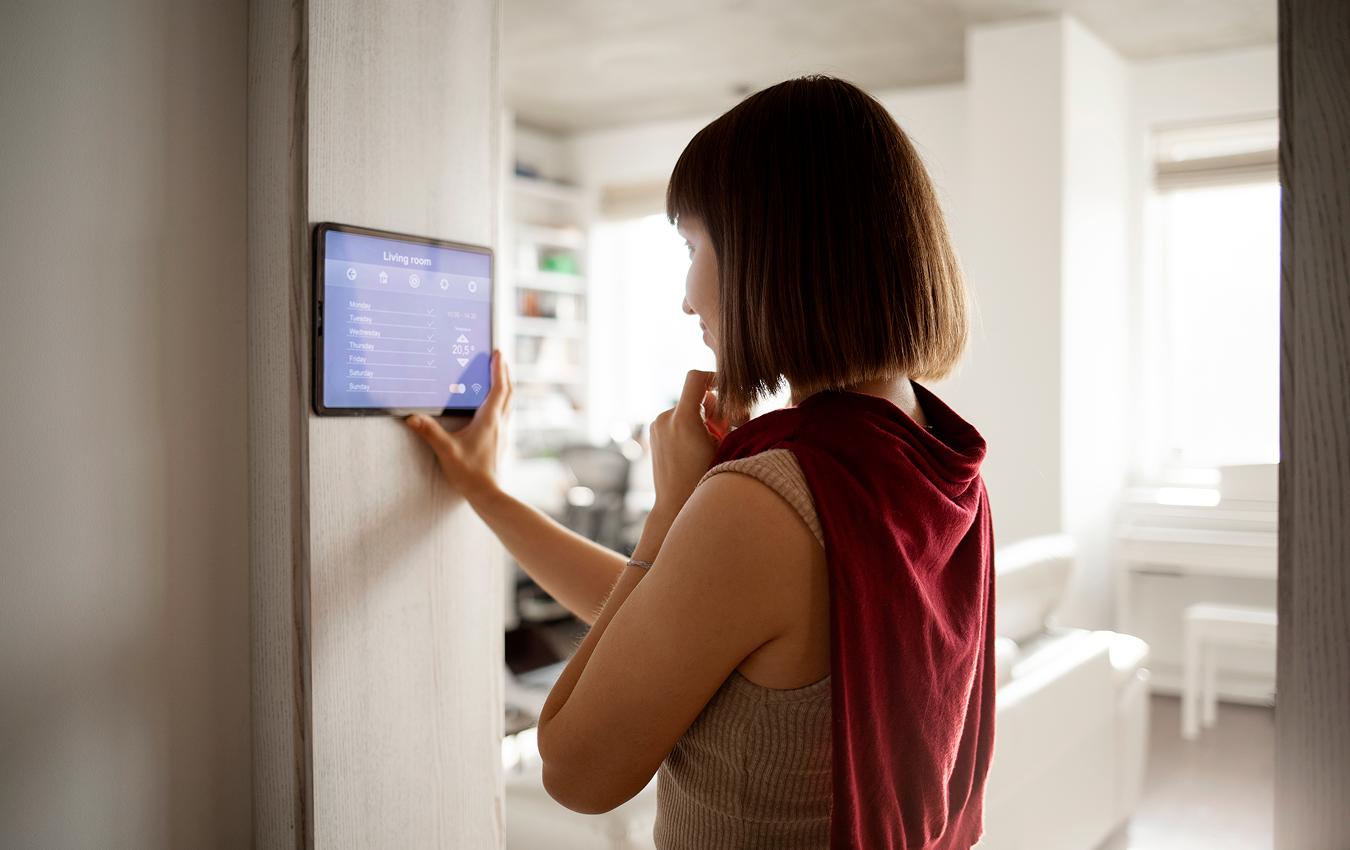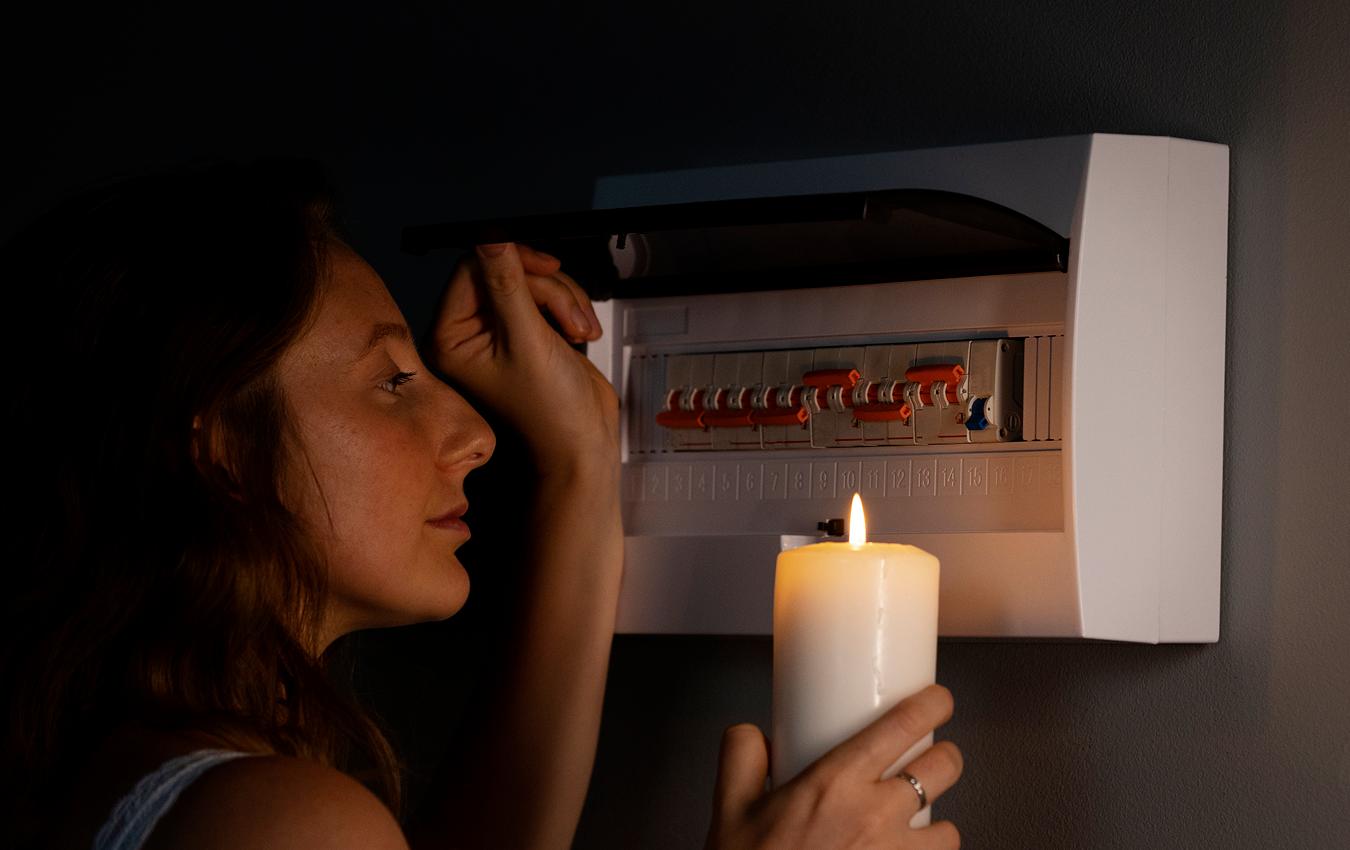Power outages can happen unexpectedly and leave you without electricity for hours or even days. This can be a stressful situation, but there are steps you can take to stay comfortable and safe until the power is restored. Here are some tips and tricks to help you prepare for and manage a power outage.
Power Outage Safety
Power outages can happen unexpectedly, and it’s important to be prepared. Make sure to have a flashlight, extra batteries, and a portable phone charger on hand. Unplug any sensitive electronics to protect them from power surges when the power comes back on. If a power outage does occur, stay calm and avoid opening the refrigerator or freezer to keep food from spoiling. If the outage lasts for an extended period of time, consider finding a temporary shelter with power or using a generator (if safe to do so).
A power outage is an event where the supply of electrical power is interrupted, either planned or unexpected. It can last for an extended period of time, causing disruptions in various services such as communication, transportation, and banking. During a power outage, essential needs such as lighting, heating, and refrigeration for food and medicine may be affected. It is important to prepare in advance and have necessary supplies on hand to ensure safety and comfort during such an event.
What to Do During a Power Outage
To prepare for a power outage, it’s important to stay informed. Keep an eye on weather reports and any alerts from local authorities through your phone, TV, or radio. If there’s a planned outage, utility officials may come to your door to let you know. You can also sign up for local alerts and warning systems that will send a call or text to your phone. By staying informed, you can be better prepared for any power outages that may occur. Experiencing a power outage can be a stressful and isolating experience. It’s important to reach out to your support network and let them know you’re okay. Check in on your loved ones and see if they need any assistance. Remember, it’s okay to ask for help if you need it.
During a power outage, it’s important to take steps to preserve the freshness and safety of your food. Eat perishable items first and avoid opening the refrigerator and freezer doors as much as possible to maintain cool temperatures. An unopened refrigerator can keep food cold for up to 4 hours, while a full freezer can maintain its temperature for up to 48 hours (24 hours if it’s only half full). If necessary, use coolers with ice to keep food cold. To ensure food safety, use a thermometer to check the temperature of your refrigerator and freezer and discard any items that have been warmer than 40 degrees F.
It’s crucial to take precautions during a power outage to avoid overloads and potential fire hazards. To avoid power surges, unplug appliances and electronics. Instead of using candles, opt for flashlights to reduce the risk of accidental fires. Only turn off utilities if there is suspected damage or if instructed to do so by local officials. It’s crucial to have a qualified professional turn on your gas line. If any circuit breakers have been tripped, contact an electrician to inspect them before turning them back on.
During a power outage, it’s important to take precautions to prevent carbon monoxide poisoning. Avoid using a gas stove or outdoor stoves indoors for heating or cooking. If you need to use a generator, make sure to keep it outside in a well-ventilated area away from windows to prevent dangerous fumes from entering your home.
It’s crucial to evaluate your situation during a power outage and decide whether it’s safe for you to stay in your house or whether you should leave. If your home becomes too hot or too cold, or if you rely on medical devices that require electricity, it’s best to seek shelter elsewhere. Many communities offer resources such as warming or cooling centers and power charging stations to help those affected by power outages.
Prepare an emergency kit.
One of the most important things you can do to prepare for a power outage is to create an emergency kit. This kit should include items like flashlights, batteries, a first aid kit, non-perishable food, and bottled water. Make sure to keep the kit in a location that is easily accessible in case of an emergency. Additionally, it’s a good idea to have a backup power source, such as a generator or portable charger, in case the outage lasts for an extended period of time.
In addition to the basic items mentioned above, consider adding other items to your emergency kit that may be specific to your needs. For example, if you have pets, make sure to include food and water for them as well. If you rely on medication that needs to be refrigerated, consider purchasing a portable cooler that can keep your medication at the appropriate temperature. It’s also a good idea to have a list of emergency contacts and important documents, such as insurance policies and identification, in a waterproof container within your kit. By preparing an emergency kit ahead of time, you can ensure that you and your family are ready for any unexpected power outages.
Have a backup power source.
As mentioned earlier, having a backup power source is crucial during a power outage. This can be in the form of a generator, which can power essential appliances like refrigerators and medical equipment, or a portable charger for your phone and other devices. Make sure to have enough fuel or battery power to last for the duration of the outage. It’s also important to use these backup power sources safely, following all manufacturer instructions and keeping them away from flammable materials.
Investing in a backup power source can save you a lot of stress and inconvenience during a power outage. A generator is a popular choice for homeowners, as it can power essential appliances like refrigerators, freezers, and medical equipment. Make sure to choose a generator that is appropriate for your needs and follow all safety precautions when using it. If you don’t need to power large appliances, a portable charger for your phone and other devices can be a lifesaver. Make sure to keep it charged and easily accessible in case of an emergency. Remember to always use backup power sources safely and follow all manufacturer instructions.
Are You Prepared For A Free Consultation Regarding The Installation Of A Home Backup Power System?
Requesting a risk-free quote is the best way to determine what size standby generator you require. Call 954-900-1696 for more information or to receive a free quote.
Keep food and water on hand.
During a power outage, it’s important to have a supply of food and water on hand to ensure you and your family stay nourished and hydrated. Non-perishable items like canned goods, granola bars, and dried fruit are great options, as well as bottled water or a water filtration system. Make sure to have enough supplies to last for several days, as power outages can sometimes last for an extended period of time. It’s also a good idea to have a manual can opener on hand in case the power outage affects your electric appliances.
In addition to non-perishable food and water, it’s also important to have a plan for keeping perishable items safe during a power outage. If you have a generator, you can use it to power your refrigerator and freezer. If not, try to keep the doors of these appliances closed as much as possible to keep the cold air inside. You can also use ice packs or bags of ice to keep food cold in a cooler. It’s important to remember to never use a gas stove or oven to heat your home or cook food during a power outage, as this can be extremely dangerous. By being prepared with food and water supplies, you can ensure that you and your family stay safe and healthy during a power outage.
Stay warm in cold weather.
During a power outage in cold weather, it’s important to stay warm to avoid hypothermia. Layering clothing and using blankets can help retain body heat. If you have a fireplace or wood stove, make sure to have a supply of dry firewood on hand. Avoid using gas stoves or ovens for heat, as this can lead to carbon monoxide poisoning. If you have a generator, make sure to use it safely and keep it outside to avoid carbon monoxide buildup.
In addition to layering clothing and using blankets, there are other ways to stay warm during a power outage in cold weather. One option is to use a portable propane heater, but make sure to use it in a well-ventilated area and follow all safety instructions. Another option is to use hot water bottles or heat packs to warm up your bed or other areas of your body. If you have a car with a full tank of gas, you can also run the engine for short periods of time to warm up and charge devices. Remember to never use a gas-powered generator or grill indoors, as this can lead to deadly carbon monoxide poisoning. Stay safe and warm during a power outage by being prepared and using caution.
Stay cool in hot weather.
During a power outage in hot weather, it’s important to stay cool to avoid heat exhaustion or heat stroke. Stay hydrated by drinking plenty of water and avoid alcohol and caffeine, which can dehydrate you. Use fans or open windows to circulate air, and if possible, move to a cooler location like a basement or shaded area. Avoid using gas stoves or ovens for cooking, as this can generate heat and make the space even hotter. If you have a generator, make sure to use it safely and keep it outside to avoid carbon monoxide buildup.
In addition to these tips, there are other ways to stay cool during a power outage. Take cool showers or baths, or use wet towels or ice packs to cool down. Wear loose, lightweight clothing and avoid direct sunlight. If you have access to a pool or lake, take a dip to cool off. And if you start to feel dizzy, nauseous, or have a headache, seek medical attention immediately, as these can be signs of heat exhaustion or heat stroke. By staying cool and hydrated, you can stay safe and comfortable during a power outage in hot weather.
Safety Tips for After a Power Outage
In the event of a power outage, it is important to stay safe and avoid any potential hazards. If you come across fallen power lines, it is crucial to keep a safe distance of at least 35 feet and avoid touching anything they may be in contact with. It is important to immediately call 911 and report the situation to ensure the safety of yourself and others.
During a power outage, it’s important to take precautions to avoid electrical shock, especially in flood areas. It’s crucial to avoid entering flooded areas or using any electrical equipment or electronics that may have been submerged. To ensure safety, it’s recommended to have a qualified electrical inspector check the electrical system before use.
It’s crucial to be cautious with your food and medications during a power outage. Any perishable items that have been stored above 40 degrees Fahrenheit should be thrown out to avoid the risk of foodborne illness. This includes dairy and meat products. Additionally, if you rely on refrigerated medication, it’s important to speak with your healthcare provider about alternative storage options during a power outage.
During a power outage, it may be tempting to use generators, camp stoves, or charcoal grills indoors to keep warm or cook food. However, this can be extremely dangerous as it can lead to carbon monoxide poisoning. To prevent this, it is important to keep these items outdoors in well-ventilated areas at least 20 feet away from windows. This will ensure that any harmful fumes are safely dispersed and do not pose a risk to you or your family.
Choosing a backup generator to keep your home running during a power outage can be a difficult task.
Premier Electrical Services can help you decide which standby generator is right for you. Call to find out more at 954-900-1696 or request a consultation
Check out the latest news:
- Commercial Energy Audit: Spotting the Sources of Energy Waste
- Protect Your Fort Lauderdale Home with Whole-House Surge Protection
- Power Outages in Fort Lauderdale: How to Protect Your Home
- Preparing for a Home Rewiring Project: A Checklist for Homeowners
- 5 Critical Signs You Need a Whole-House Surge Protector





